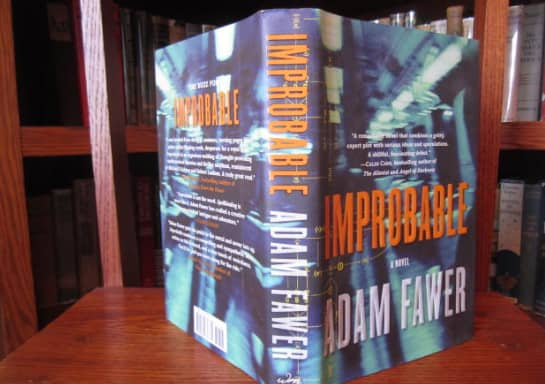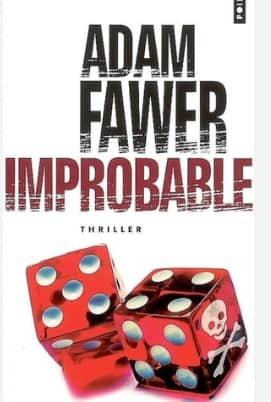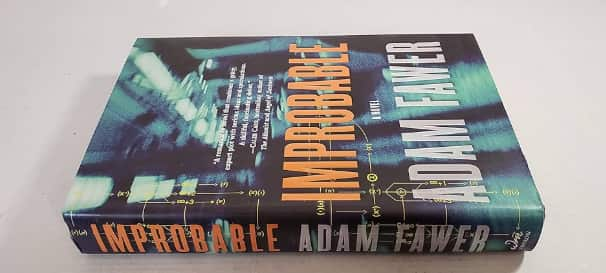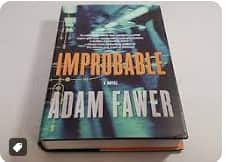Contents
We make countless decisions every day. Which job to apply for, which project to choose, which risk to take… But what if it were possible to predict the outcomes of these decisions? If we could solve the future like a mathematical equation, could we guarantee success? American author Adam Fawer‘s book, Improbable, which became a global phenomenon upon its publication, offers a breathtaking adventure that pursues precisely these questions.
This book isn’t just a thriller; it’s a puzzle built on probability theory, chess, neurology, and the mysteries of the human brain, one that will challenge your mind to its limits.
Let’s delve into this genius fiction and together question how real “free will” really is.

The Plot and Beginning of the Story: The Game
Improbable begins by presenting glimpses into the lives of several seemingly disparate characters, seemingly unaware of one another, and hints at how these lives will intersect in incredible ways. At the center of the story is David Caine, a brilliant 31-year-old statistician and chess enthusiast. However, David’s life is shattered by tragedy. He loses his wife in a car accident and, due to damage to his left hemisphere, begins experiencing “epileptic seizures.” These seizures transform his life into a nightmare; he experiences memory loss, loses his job, and spirals into a deep depression.
As David’s life unfolds in a mundane and painful way, he begins to realize during one of his seizures that he possesses a peculiar ability. It’s as if he can “see” seconds, sometimes even minutes, into the future, visualizing every possible path events could take in his mind like a schematic diagram. For example, while watching a baseball game, he can predict exactly where the pitcher’s next pitch will land and what the outcome will be. While he initially thinks this is a side effect of his seizures, he gradually realizes that this ability is much more than that.
At the same time, in a different part of the world, a group of scientists conducting a secret CIA-backed government project is developing test subjects who can fully utilize the human brain’s potential and foresee the future. The project’s leader is the ambitious and ruthless scientist Dr. Tversky. The project’s most successful “product” is Jasper Cates, a cold-blooded and dangerous man with incredible precognitive abilities. However, Jasper decides to use this power for his own personal gain and revenge, spiraling out of control.

Jasper’s Escape and New Plan!
The story’s ignite is Jasper’s escape from the project and his own dark plans. Realizing that the only person who can stop him is David Caine, who isn’t yet fully aware of his abilities, Dr. Tversky and his team launch an operation to find David. Thus, David, who has avoided taking risks throughout his life and is lost in his own pain, suddenly finds himself caught in the middle of an international conspiracy, ruthless agents, and a mind-reading psychopath.
Improbable tells the breathtaking story of how an ordinary man, with an extraordinary ability acquired through an anomaly in his brain, is drawn into the center of a power struggle that could affect the fate of the world. The book depicts a relentless game of cat and mouse as David tries to understand and control his abilities while evading both himself and his pursuers.
Improbable Characters: Players and Pawns
- At the heart of the novel is David Caine, the tragic hero with whom the reader immediately connects. He is not a superhero. On the contrary, he is a profoundly “human” character, possessing fears, weaknesses, and pain. His past trauma has alienated him from life, causing him to withdraw into his shell. However, this “flaw” in his mind also becomes his greatest “gift.” David’s journey is not only one of escaping the dangers that pursue him, but also one of finding himself in the labyrinths of his own mind, overcoming that crushing grief and struggling to reconnect with life. His chess knowledge, his ability to analyze the problems he faces and think several moves ahead, are his most important weapons that enable him to survive in this deadly game.
- The “villain” of the story is Jasper Cates, a dark reflection of David’s abilities. Like David, Jasper can foresee the future, but he has consciously trained and perfected this ability for years. He is a man devoid of emotion, viewing people as mere pawns, and devoid of moral boundaries, willing to do anything to achieve his goals. Jasper isn’t just a physical threat to David, he’s also a mirror of the dark future he could potentially become. The moments when their minds collide constitute the novel’s most tense and cleverly constructed sections.
- Caught between these two main characters and a keystone of the story is Nava, a mysterious and beautiful woman who helps David. Nava acts as a guide, helping David adapt to this complex world, revealing his abilities and the identity of those who pursue him. The relationship that develops between her and David offers the reader a breathtaking, human and emotional refuge amidst the story’s rapid pace and scientific complexity.

Dr. Tversky and Others
Dr. Tversky, on the other hand, is a character who questions the moral limits of science and state power. While he claims to work for the good of humanity, he is ambitious and manipulative, unwavering in his disregard for human life. He is a dangerous exponent of the philosophy that “the end justifies the means.” His project is a testament to how destructive science can be when combined with uncontrolled power.
Ultimately, the characters in Improbable are not merely extras in an action sequence; they represent diverse philosophies and moral choices. While David’s journey demonstrates the extraordinary potential an ordinary person can possess under the right motivation and circumstances, Jasper’s story reveals how that same power can corrupt.

Mind Games: Probability, Quantum and Destiny
The most significant feature that distinguishes this novel by Adam Fawer from other thrillers is the way it interweaves the story with compelling scientific and philosophical concepts. As the title suggests, probability theory forms the basis of the book. David’s talent isn’t actually a magical “seeing” of the future, but rather a chess player’s ability to calculate the most likely outcomes based on current data. This approach, which argues that every event in life is the result of a previous event and contains countless possibilities, prompts the reader to question whether such a thing as “coincidence” exists.
This theory merges with more complex and thought-provoking concepts, such as quantum physics‘s “many worlds” interpretation, in the following pages of the book. According to this interpretation, with every decision we make, the universe splits into different probabilistic paths, and all these probabilities occur simultaneously in different parallel universes. Perhaps the things David sees during his seizures are a reflection of the different outcomes in these parallel universes.
This offers a fantastic answer to questions we all ask, such as, “What would my life have been like if I hadn’t gone to work that day?” All this scientific grounding fuels the story’s central philosophical question: How much control do we have over our lives? If our next step can be calculated statistically, is what we call “free will” even real, or are we simply pieces of a complex equation? Improbable presents this profound discussion of fate and free will not in the tedium of a philosophy book, but in breathtaking action.

Why Read The Improbable Novel?
David’s passion for chess is a perfect metaphor in this sense. Chess is a game of infinite possibilities on a board with limited rules. A good player calculates not only the current move but also the possible scenarios a few moves ahead. This is precisely David’s struggle for survival. He must learn to view life like a chessboard and always be a few moves ahead of his opponents.
In conclusion, Adam Fawer doesn’t just tell his readers a story; he also offers them an intellectual game that challenges them to reflect on fundamental concepts of physics and philosophy. We can guarantee that by the time you finish the book, your perspective on the world and your own decisions will never be the same again.
Improbable reminds us that success comes not only from hard work, but also from the ability to accurately interpret data, calculate probabilities, and think strategically, like a software developer. David Caine’s story is proof that even in the most desperate moments, a way out can be found by developing a different perspective and accurately analyzing the available data. It shows us how every small decision we make can have a profound “butterfly effect” in the future. This book is a reference book for anyone who sees their career as a chess game, plans every move carefully, and likes to calculate risks and probabilities.
If you’re looking for an adventure that will challenge your mind, keep you on the edge of your seat, and make you question everything you thought you knew about the world, then it’s time to dive into the possibility-filled world of Improbable.
#adamfawer
#improbable
#improbablenovel
